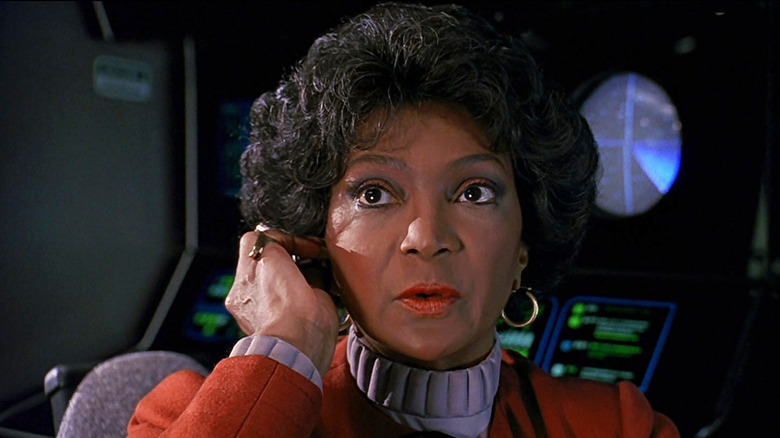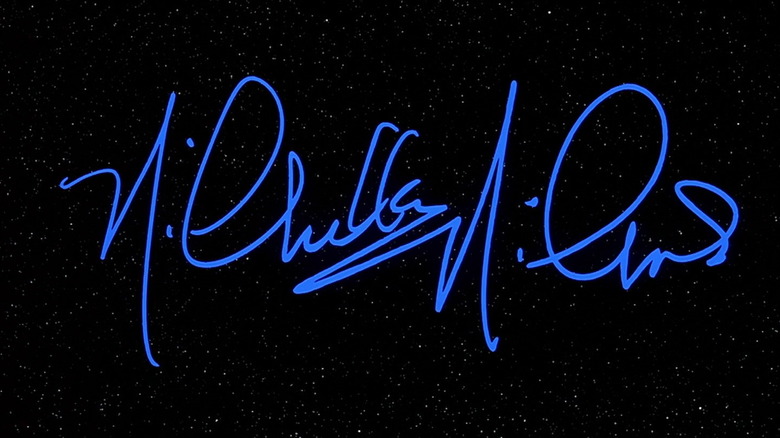We might obtain a fee on purchases produced from hyperlinks.
Nicholas Meyer’s 1991 movie “Star Trek VI: The Undiscovered Nation” was a very good sendoff for the unique forged of “Star Trek.” It had been 25 years since “Star Trek” debuted, and the franchise had already discovered new footing with “Star Trek: The Subsequent Technology,” a sequence that was in its fourth season when “The Undiscovered Nation” got here out. The movie was concerning the collapse of the Klingon Empire and the start of a brand new period of peace. Naturally, there have been secret dangerous actors afoot who needed to maintain the Chilly Battle between the Federation and the Klingons raging, and the sixth flick within the franchise follows the fallout after an assassination try. It is simply as a lot Tom Clancy as it’s a house journey.
The movie ended with the usS. Enterprise saving the day, and the crew — Walter Koenig, William Shatner, Leonard Nimoy, DeForest Kelley, George Takei, Nichelle Nichols, and James Doohan — gathered on the bridge to catch their breath. Uhura (Nichols) declares to the bridge that the Enterprise has been ordered again to Starfleet command … to be decommissioned. Everyone seems to be struck by the load of the order. This actually was the ultimate journey. Spock (Nimoy) then gives that they merely inform Starfleet to go to Hell, they usually sail off on their very own. Presumably, they weren’t apprehended by safety or punished for stealing the ship. “Second star to the appropriate, and straight on ’til morning,” Kirk says.
Then the credit start, that includes the on-screen autographs of every of the above seven actors. It is a candy acknowledgment of the forged. After the autographs, the credit start to roll, and Trekkies will instantly spot an error, inflicting a number of the farewell majesty to come back crashing down. Nichelle Nichols is credited as having performed “Uhuru.” Her character was Commander Nyota Uhura. After 25 years, how did this fundamental typo make its method onto the large display?
The reply might be discovered within the 1997 ebook “Inside Star Trek: The Actual Story” written by Herbert F. Solow and Robert Justman.
Who the heck is ‘Uhuru?’
When Gene Roddenberry was nonetheless creating “Star Trek” again in 1966, he imagined the communications officer to be a Black girl named Lieutenant Sulu. Solow, who labored on the sequence as growth coordinator, recommended that “Sulu” was too near “Zulu,” and he did not just like the racial implications. Roddenberry heeded Solow’s recommendation and moved the “Sulu” title over to the ship’s Japanese helmsman (although there is no such thing as a “L” sound within the Japanese language).
In 1962, writer Robert Ruark revealed a ebook known as “Uhuru: A Novel of Africa At this time,” utilizing the Swahili phrase for “freedom.” Justman, who served as a producer and manufacturing designer, was conscious of the novel and talked about it to Roddenberry. When Roddenberry realized what “Uhuru” meant, he repurposed it as “Uhura,” and used it because the title for his communications officer.
In fact, the title Uhura was utilized in 69 episodes of the unique “Star Trek” sequence, in 16 episodes of “Star Trek: The Animated Sequence,” and in 5 characteristic movies previous to the discharge of “Star Trek VI: The Undiscovered Nation.” That is to say nothing of the tons of of novels and ancillary tie-in merchandise that had the title “Uhura” written throughout it. It isn’t like there had been confusion concerning the spelling, or which model was thought of “official.” It was at all times “Uhura.”
Evidently whoever typed out the credit for “Star Trek VI” merely botched their job, as did any editors or proofreaders who stood between that spelling mistake and the large display. It is unclear if that individual was consulting some very, very early manufacturing notes from “Star Trek” and noticed the improper title, or if it was a typographical error. Both method, Trekkies now needed to witness this little blunder on the tail finish of what was presupposed to be a celebratory and dignified sendoff. Oh, nicely.

